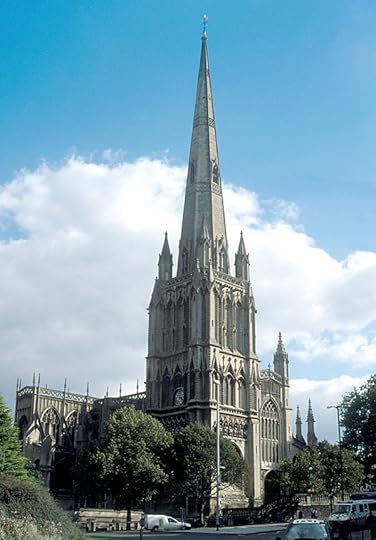The bizarre tale of Thomas Chatterton, the boy who inadvertently invented modern literature, just to cover up his forgeries.
If you’re like me you have never heard of the young Thomas Chatterton, but he has influenced the giants of romantic literature. William Wordsworth wrote that he was a marvelous boy, John Keats dedicated Endymion to him, even Percy Shelley ranked him high among his favorite authors. For a boy who committed suicide at seventeen, it is remarkable that he would lead such an amazing literary life after his early death.
In my novel, Chronologica, I mention the incredible story of Chatterton, but here on my blog I will tell you a little more. Chatterton was born on Novermber 10th 1752 in Bristol England. Shortly after he was born his father died, leaving his young mother to raise him, with a number of sisters. Chatterton loved reading, especially the ancient luminary works of medieval and renaissance poets; Geoffrey Chaucer, Edmund Spenser, William Shakespeare, and other literature he could find provided for the backdrop of his rich poetry. His room looked out over St. Mary Redcliffe a Gothic styled Anglican parish church.

In my novel, I used Chatterton simply to prove a point about forgeries and how they can trick even the best scholars, but neglected to pontificate on his true genius.
My favorite poem by Chatterton is the “Romance of the Knight” or The Romaunte of the Knyghte by John de Bergham. It is a romantic tale of a ruffian knight, who attacks a fair damsel in distress, but is killed by a virtuous knight. Here is the poem, as he translated it from his fake forgeries of medieval text.
THE ROMANCE OF THE KNIGHT
The pleasing sweets of spring and summer past,
The falling leaf flies in the sultry blast,
The fields resign their spangling orbs of gold,
The wrinkled grass its silver joys unfold
Mantling from every hill the ravish’d sight.
The yellow flag uprears its spotted head,
Hanging regardant o’er its wat’ry bed;
The worthy knight ascends his foaming steed,
Of size uncommon, and no common breed.
His sword of giant make hangs from his belt,
Whose piercing edge his daring foes had felt.
To seek for glory and renown he goes
To scatter death among his trembling foes;
Unnerv’d by fear they trembled at his stroke;
So cutting blasts shake the tall mountain oak.
Down in a dark and solitary vale
Where the curst screech-owl sings her fatal tale,
Where copse and brambles interwoven lie,
Where trees intwinning arch the azure sky,
Thither the fate-mark’d champion bent his way,
By purling streams to lose the heat of day,
A sudden cry assaults his list’ning ear,
His soul’s too noble to admit of fear.—
The cry re-echos, with his bounding steed,
He gropes the way from whence the cries proceed.
The arching trees above obscur’d the light
Here ‘twas all evening, there eternal night.
And now the rustling leaves and strengthened cry
Bespeaks the cause of the confusion nigh;
Through the thick brake the astonish’d champion sees
A weeping damsel bending on her knees;
A ruffian knight would force her to the ground,
But still some small resisting strength she found.
(Women and cats, if you compulsion use,
The pleasure which they die for will refuse.)
The campion thus; Desist, discourteous knight,
Why dost thou shamefully misuse thy mighte.
With eye contemptuous thus the knight replies,
Begone! Whoever dares my fury dies.
Down to the ground the champion’s gauntlet flew,
I dare thy fury, and I’ll prove it too.
Like two fierce mountain boars enraged they fly,
The prancing steeds make Echo rend the sky,
Like a fierce tempest is the bloody fight,
Dead from his lofty steed falls the proud ruffian knight.
The victor, sadly pleas’d, accosts the dame,
I will convey you hence to whence you came.
With look of gratitude the fair replied
Content, I in your virtue may confide.
But, said the fair, as mournful she survey’d
The breathless corse upon the meadow laid,
May all thy sins from heaven forgiveness find!
May not thy body’s crimes affect thy mind!
This virtuous style of Chatterton is not like those old works that he tried to emulate, but a modern romantic notion of chivalrous knights rescuing damsels in distress. Great stuff that would belong in any modern novel or film of today, and Chatterton created all this while pretending to be copying the medieval text of fictitious writers of the past.
One of my favorite quotes of Chatterton, and one that has just as much meaning as today, as when it was written 250 years ago.
“When raving in the lunacy of ink, I catch the pen and publish what I think.”
Want to learn more about Thomas Chatterton (Read Chronologica) and check out these links:
Wikipedia’s Article on Chatterton
Thomas Chatterton and the Rowley Forgeries
A romantic re-telling of Thomas Chatterton
My Twitter Feed




